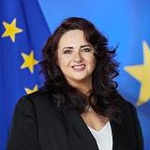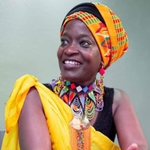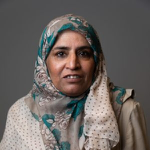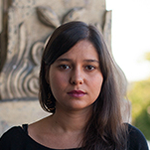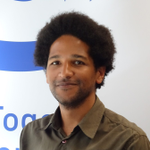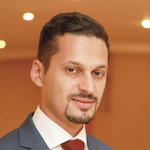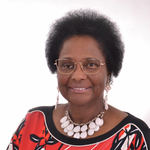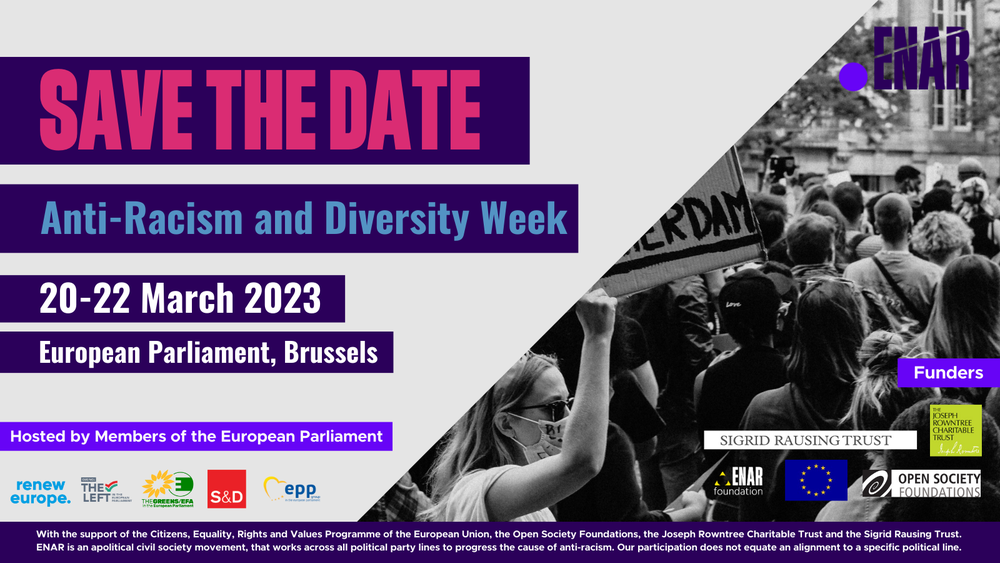
You may consult the full agenda HERE
- Registration
- Opening and Keynote Speeches
Helena Dalli•Roberta Metsola•Nyanchama Okemwa•Samira Rafaela•Gabriela RamosOpening Plenary
• Welcoming words by MEP Samira Rafaela, RENEW Europe, The Netherlands
• Welcoming words by Ms. Roberta Metsola, President of the European Parliament (video message)
• Welcoming words by Ms Ursula Von Der Leyen, President of the EU Commission
• Key-note speech by Ms. Helena Dalli, EU Commissioner for Equality
• Welcoming words by Ms. Nyanchama Okemwa, Hand in Hand Against Racism and ENAR Board member
• Welcoming words by Ms. Gabriela Ramos, Assistant Director-General for Social and Human Sciences at UNESCO (video-message)
• Welcoming words by Ms. Petra Bayr, General Rapporteur on combating racism and intolerance: Committee on Equality and Non-Discrimination, Parliamentary Assembly of the Council of Europe (video-message) - Racial Justice and Policymaking • State of the Art in the Member States
Dan Doghi•Pascale Falek•Shada Islam•Marion Lalisse•Michaela Moua•Ojeaku NwabuzoRacism divides communities and polarizes societies. It affects the lives of ethnic and racialised minorities in Europe in every part of their life, whether that is in education, in employment or in every day's errands. The EU’s anti-racist agenda was further strengthened with the launch of the EU Anti-racism action plan in 2020 by the European Commission, in the aftermath of the murder of George Floyed in the U.S., an African-American man who died in the hands of law enforcement. The appalling murder of Floyd has generated debates in the EU’s high political systems on the state-of-play of racism and discrimination in its different multifaceted and intersectional manifestations, which resulted into the EU ARAP. The role of Member States in designing and implementing the National Anti-racism Action Plans is a crucial complementary commitment to the EU’s efforts in establishing a long-term, strong and constructive anti-racist route.
This panel will discuss the EU institutional efforts to combat specific forms of racism and propose how existing strategies and plans can serve as exemplary frameworks to counter rising forms of discrimination. While acknowledging that going beyond interpersonal racism and shifting towards the recognition of systemic, structural and institutional racism is the way forward, this panel will also not shy away from talking about challenges to apply this approach in practice. The cross-cutting theme of the panel is united in diversity, solidarity and intersectionality as the speakers represent different communities experiencing racism.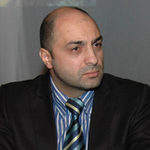
Dan Doghi
Anti-racism and Roma unit of the European Commission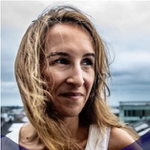
Pascale Falek
European Commission - office of the Coordinator on combating Antisemitism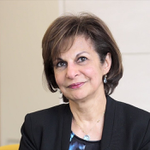
Shada Islam
Advisor/Analyst on Europe, Africa, Asia, geopolitics, trade and on inclusion
Marion Lalisse
EU Coordinator on Combating Anti-Muslim Hatred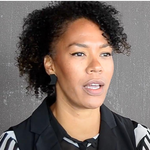
Michaela Moua
EU Anti-Racism Coordinator
Ojeaku Nwabuzo
ENAR Director
- Lunch Break
- Going Beyond the EU Policies • Anti-racism on the ground-promising practices and supportive mechanisms
Cornelia Ernst•Romeo Franz•Petra Laiti•Sinead Lucey•Isabela Mihalache•Henri Nickels•Nyanchama OkemwaThe EU Frameworks and funding mechanisms, as well as different guidelines have been created to help the Member States develop national policies and a diversity of actors to address the issues at different levels. But to what extent these actually help racialised communities on the ground challenge different manifestations of racism they experience every day. Furthermore, we will engage into thinking together what are the conditions /factors that contribute to implementing promising practices, including going beyond EU support mechanism.
This panel will look into challenges, but also to the bright side, share good experiences concerning initiatives that work and share the panelists’ know-hows and answer the questions such as ‘What really works on the ground?’, ‘What conditions are necessary for an initiative to fulfill so communities actually benefit from it?’, ‘How do you create these conditions in your context?’ - Coffee break and networking space
- Speed-dating with MEPs
- De-buzzing Intersectionality: Real life experiences and national and European responses to intersectional discrimination
Zlakha Ahmed•Milan Brglez•Marina Csikós•Sandrine Gashonga•Camila Piastro•Hande Taner•Juliana WahlgrenIntersectionality has become a buzzword in many social justice circles, but what does it really mean and how can it be applied to create meaningful change? This panel discussion aims to de-buzz the term intersectionality and explore its practical applications in advancing social justice.
Intersectionality is a concept that acknowledges that people's experiences of oppression and privilege are shaped by the intersections of their social identities, such as race, gender, sexuality, class, disability, and religion. It recognizes that these identities cannot be understood in isolation from one another and that people may experience different forms of oppression simultaneously.
This panel discussion brings together experts from diverse fields to explore the concept of intersectionality and its relevance in today's society. They will share their insights on how various forms of oppression intersect and impact marginalized groups, and discuss strategies for addressing these complex issues.
The panelists will discuss their perspectives on how intersectionality can be used as a tool for understanding and addressing the ways in which different forms of oppression intersect and impact marginalized groups. They will also explore the limitations of intersectionality and how it can be further developed to better address issues of power, privilege, and inequality.
Some of the topics that the panelists may cover include:
How different social identities intersect and create unique experiences of oppression and privilege
The impact of intersectionality on health, education, employment, and other areas of life
The challenges and opportunities of intersectional activism and advocacy
The role of intersectionality in creating more inclusive policies and practices in various sectors
The intersectionality of environmental justice and the impact on marginalized communities
The impact of intersectionality on social movements and activism
The panel discussion will include opportunities for the audience to ask questions and engage with the speakers. This event will critically examine the concept of intersectionality and its applications in advancing social justice. This discussion is envisioned to be a thought-provoking conversation on how we can move beyond buzzwords to create meaningful change.
- Registration
- Laws in Practice • Gaps and implementation of EU Directives and national laws
Mpanzu Bamenga•Vivien Brassoi•Lilla Farkas•Daris Recio Lewis•Samira Rafaela•Amiirah Salleh-HoddinThis panel discussion aims to explore the current gaps in the implementation of anti-discrimination law and EU directives across member states. The panel will consist of experts in law, policy, and civil society who will share their experiences and perspectives on the challenges and opportunities of implementing anti-discrimination law and EU directives.
The discussion will begin by examining the legal framework of anti-discrimination law and EU directives, including the key principles and provisions that member states are required to uphold. The panelists will then address the practical challenges and gaps in implementation that they have observed in their respective fields, including:
The role of public institutions, judiciary system, equality bodies and human rights institutions in enforcing anti-discrimination law and EU directives.
The challenges faced by individuals and civil society organizations in accessing justice and remedies for discrimination.
The impact of intersecting forms of discrimination and how they are addressed by anti-discrimination law and EU directives.
The need for greater awareness-raising and education to promote a culture of non-discrimination and diversity.
The panelists will also discuss possible solutions and best practices for addressing these gaps, including:
Strengthening the enforcement mechanisms of anti-discrimination law and EU directives at national and EU levels.
Ensuring that individuals and civil society organizations have access to effective and affordable remedies for discrimination.
Promoting intersectionality in anti-discrimination law and policy.
Increasing awareness-raising and education efforts to promote a culture of non-discrimination and diversity.
Throughout the discussion, the panelists will draw on their experiences and insights to provide practical recommendations for policymakers, civil society organizations, and individuals who are working to promote equality and combat discrimination. The audience will have the opportunity to participate in the discussion through a Q&A session. - Coffee break
- Judicial system from law enforcement to courts • Is the Criminal justice system just?
Sarah Chander•Farid Hafez•Pierrette Herzberger-Fofana•Peter Pollak•Senada Sali•Sabrina Saoudi•Alyna SmithNumerous human rights activists' groups have been pointing out for many years how biases and institutional racism racialization in the criminal justice system are manifested in police practices toward minorities, such as profiling, harassment, unwarranted stops and searches, and unfair arrests. The wider criminal justice systems of Europe have largely escaped scrutiny for the damage they cause to the lives of people belonging to racialised minorities. From the public prosecutor to the defense lawyers, from the police inspectorates to domestic court judges - institutional racism at every level of the criminal justice system is leading to higher incarceration rates, unfair sentencing, and discriminatory and negligent treatment of racialised minority groups in Europe. These practices are not new; with the help of AI systems, the systemic inequalities that they reinforce are compounded. There is a lot of opacity regarding the use of surveillance systems in the context of policing and migration. Understanding its use and deployment is essential for the development of a better criminal justice system.
Coalitions remain a crucial part in the process of ensuring a just and representative judicial system. Civil society organizations become especially important as they represent the marginalised minorities with an invested interest in advocating for their needs, dignity and rights. - Lunch break
- Parallel Workshops
Workshop 1: Migration, Social exclusion and poverty.
Exploring solutions for migrants rights in social policy
Organised and facilitated by the European Anti-Poverty Network
Room: SPINELLI 1G1
Workshop 2: Hate crime or hate speech
On Europe's Streets: Clearing up the Hate
Organised and facilitated by B'nai B'rith International and the European Union of Jewish Students
Workshop 3: Climate justice
The racialisation of the climate crisis: experiences, responses and ways forward
Organised and facilitated by the European Network Against Racism
Workshop 4: Approaching racial equality from a decolonial perspective
Organised and facilitated by Yanda Bango Tischmeyer, decolonial scholar - Coffee break
- Concluding remarks
